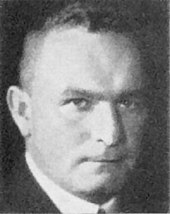Heinrich Josef Schmidt
Heinrich Josef Schmidt (born March 19, 1889 in Oppershofen , † June 15, 1945 in Bochum ) was a German politician ( center ).
Live and act
After attending the Progymnasium zu Dieburg and the grammar school in Mainz , where he passed the Abitur, Schmidt studied agriculture at the University of Giessen . From 1914 to 1918 Schmidt took part in the First World War as a reserve lieutenant with infantry regiments 116 and 468 . During the war he was decorated with the Iron Cross of both classes , the Hessian Medal for Bravery and the Badge for Wounded .
On September 1, 1919, Schmidt took over the management of the agricultural district association in Lippstadt. He also became managing director of the milk control associations in the Lippstadt district, chairman of the Lippstadt district's visiting ring, chairman of the supervisory board of the Westphalian egg processing cooperative and chairman of the egg processing cooperative in Lippstadt and the surrounding area.
Politically, Schmidt joined the Catholic Center Party . From July 1932 to June 1933 he sat for them as a member of the Reichstag , in which he represented constituency 18 (Westphalia-South). During his time as a member of parliament, Schmidt voted, among other things, for the adoption of the Enabling Act introduced by the Hitler government in March 1933 , which was to form the legal basis for the establishment of the Nazi dictatorship .
Web links
- Heinrich Josef Schmidt in the database of members of the Reichstag
Individual evidence
- ↑ Life data according to Wilhelm Heinz Schröder : BIORAB-Online ( Memento of the original from March 4, 2016 in the Internet Archive ) Info: The archive link has been inserted automatically and has not yet been checked. Please check the original and archive link according to the instructions and then remove this notice. (Determine data record via search function)
| personal data | |
|---|---|
| SURNAME | Schmidt, Heinrich Josef |
| BRIEF DESCRIPTION | German politician (center), MdR |
| DATE OF BIRTH | March 19, 1889 |
| PLACE OF BIRTH | Oppershofen |
| DATE OF DEATH | June 15, 1945 |
| Place of death | Bochum |
